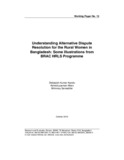Understanding alternative dispute resolution for the rural women in Bangladesh: Some illustrations from BRAC HRLS rogram
Date
2010-10Metadata
Show full item recordAbstract
During the last decade, Alternative Disputes Resolution (ADR) gained enormous currency in the rural development arena as an informal justice institution in Bangladesh, and BRAC’s HRLS Program has contributed in the domain of ADR of Bangladesh significantly. This study explored the contribution of ADR of HRLS program in ensuring social justice for the rural poor women in Bangladesh. Data were collected in two phases applying qualitative methods. The first phase observed 26 trial sessions from the legal aid program and in second phase 10 ADR cases were selected to interview regarding parties. ADR provided the functional alternative of traditional shalish to the rural poor women. The study observed the disputes of ADR were the demand for dower and maintenance, the demand for dowry money and assets, regain of conjugal rights and appeal for separation and divorce. But all the cases had a common background in terms of physical torture, mental abuse, not to provide adequate food. The ADR process contributed to providing social protection to the women victims and kept social harmony in a short-range. The process sometimes gets crippled for the weak procedure, alleged as women-biased, lack of skills and resources. Most of the Program Organizers (POs) had no legal background, upgrade knowledge and skills as they often had to apply their common sense and defector experiences in conducting the sessions. In conclusion, it can be said that the whole ADR process has contributed a lot in providing social justice to women. HRLS program can initiate publicity through billboard, miking, TV and radio commercial, cinema hall advertisement for ADR, which may enhance participation and level of awareness and ensure access to information on ADR services. HRLS program also may consider some initiatives to reduce insecurity and vulnerability of the clients during and post ADR period.

